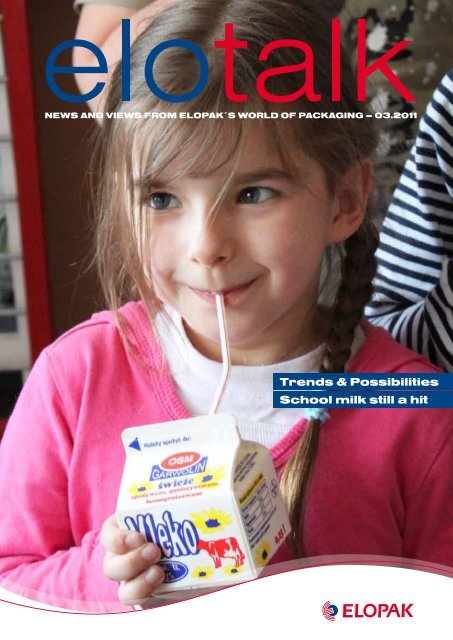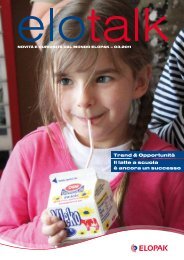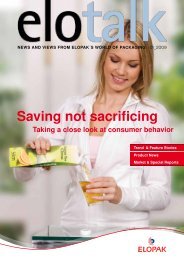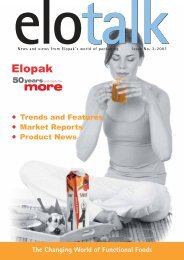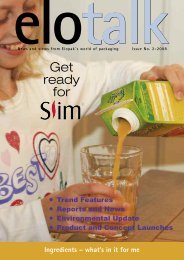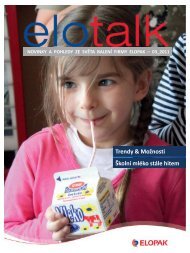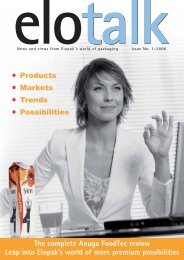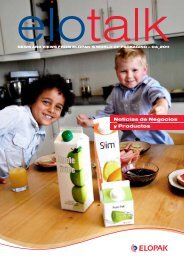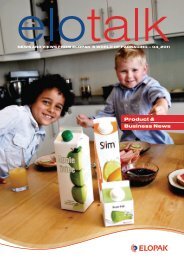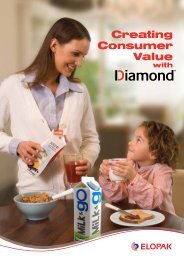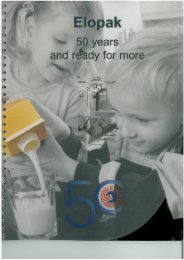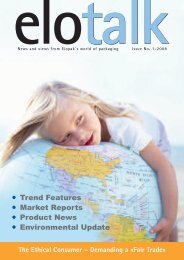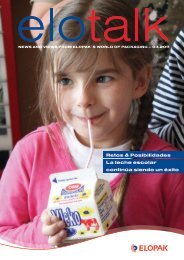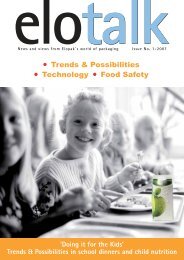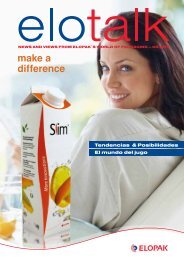Trends & possibilities school milk still a hit - Elopak
Trends & possibilities school milk still a hit - Elopak
Trends & possibilities school milk still a hit - Elopak
Create successful ePaper yourself
Turn your PDF publications into a flip-book with our unique Google optimized e-Paper software.
News aNd views from elopak´s world of packagiNg – 03.2011<br />
<strong>Trends</strong> & <strong>possibilities</strong><br />
<strong>school</strong> <strong>milk</strong> <strong>still</strong> a <strong>hit</strong>
World School Milk day<br />
Building foundations for future dairy markets<br />
Since the launch of World School Milk Day in 2000 by the Food and Agriculture<br />
Organization of the United Nations, over 70 countries have taken part in activities.<br />
The UN’s Michael Griffin who was involved with the<br />
launch of World School Milk Day told Elotalk that, “The<br />
international open event was set up by the FAO to help<br />
promote the idea that <strong>milk</strong> is good for kids, and it was<br />
first launched via a <strong>school</strong> <strong>milk</strong> email network and has<br />
sinc e grown by this means and via the internet.”<br />
World School Milk Day always falls on the last Wednesday<br />
in September, chosen because <strong>school</strong>s are open in<br />
most countries at this time. It is an open event and<br />
people are free to celebrate how they wish which has<br />
included over the last ten years such as:<br />
• Australia ran the ‘Milk It’ competition for primary<br />
<strong>school</strong> kids to create a cartoon character to illustrate<br />
why drinking <strong>milk</strong> is great<br />
<strong>Trends</strong> & <strong>possibilities</strong><br />
Published by <strong>Elopak</strong> AS Group Headquarters.<br />
Postbox 418 Skøyen, 0213 Oslo, Norway.<br />
Tel: +47 31 27 10 00, Fax: +47 31 27 15 00<br />
Editor: Jutta Pinnerød<br />
Research: Stephanie Sergeant, Caroline Sephton<br />
Layout, Prepress and Print: Kampen Grafisk as.<br />
June 2011<br />
• Kids in South Korea made a map of the world<br />
entirely from <strong>milk</strong> cartoons<br />
• The Danish School Milk Scheme invited all<br />
650,000 <strong>school</strong> children to enter photo competition<br />
for WSM<br />
• In Pakistan, WSMD has been celebrated in a day<br />
long carnival attended by 24,000 people<br />
• In Singapore, kids drank <strong>milk</strong> together on WSMD to<br />
raise $32,000 for charity<br />
• In Croatia, kids designed posters about why they like<br />
drinking <strong>milk</strong><br />
Content Page Page<br />
World School Milk day 3<br />
Success for Reid’s 4<br />
Promoting better Child Health 6<br />
School Milk goes Green in uk 8<br />
School Milk: a point of view 10<br />
Polish School Milk:<br />
15 years and 15 dairies<br />
Printed on 100% recycled paper<br />
MILJØMERKET<br />
241 Trykksak 625<br />
14
Drawing attention to <strong>milk</strong><br />
The aim of WSMD is to have a particular day when<br />
attention is focussed on <strong>school</strong> <strong>milk</strong> to promote the<br />
distribution of <strong>milk</strong> in <strong>school</strong>s. “World School Milk Day is<br />
an open day – people are free to celebrate how they<br />
wish and they can be at a national or regional level, and<br />
even just for individual <strong>school</strong>s or classes. Some<br />
countries have started in a small way and have organised<br />
larger events every year. Big or small, all have a common<br />
goal: to draw attention to <strong>school</strong> <strong>milk</strong> and thereby<br />
promote its consumption,” says Michael Griffin.<br />
“The FAO has been pleased by the successful uptake of<br />
the idea, the internet has provided the perfect vehicle to<br />
share events and experiences from around the world,”<br />
adds Michael Griffin.<br />
“By creating demand, <strong>school</strong> <strong>milk</strong> programmes can<br />
directly benefit dairy development. In Japan, for<br />
example, a <strong>school</strong> <strong>milk</strong> programme helped increase its<br />
annual <strong>milk</strong> consumption from 5litres/person at the start<br />
of 60s to 80 litres today. Imagine if the same result was<br />
achieved in China?”<br />
Creating habits for future consumers<br />
“School <strong>milk</strong> is not an easy market, but from the industry<br />
as a whole it has to acknowledge that <strong>school</strong> children<br />
are tomorrow’s consumers. One of the aims of WSMD<br />
and also World Milk Day which is held in June is to help<br />
develop the habit of <strong>milk</strong> consumption in children. If<br />
children do not grow up drinking <strong>milk</strong> or eating dairy<br />
products, they are not going to do so in later life when<br />
they are consumers.” concludes FAO’s Michael Griffin.<br />
With this in mind, and the facts that <strong>milk</strong> is considered a<br />
necessary component of a child’s diet, <strong>school</strong> <strong>milk</strong><br />
represents an important vehicle for <strong>milk</strong> promotion.<br />
So, what can you do to support the 12th World Milk<br />
School Milk Day, Wednesday September 28, 2011?<br />
Interested in joining the FAO <strong>school</strong> <strong>milk</strong> email list<br />
or finding out more?<br />
Then contact: School-Milk-Owner@fao.org<br />
<strong>school</strong> <strong>milk</strong> <strong>still</strong> a <strong>hit</strong> 3 – 2011<br />
3
Success for Reid’s<br />
A fresh twist on School Milk<br />
The Canadian dairy has almost doubled its shipments of <strong>school</strong> <strong>milk</strong>, with a little help<br />
from <strong>Elopak</strong>. Age-group targeted packaging has allowed Reid’s Dairy to gain market<br />
share from larger competition with volume more than doubling since its 2007 launch.<br />
The success of the <strong>school</strong> <strong>milk</strong> has even led to increased sales of other Reid’s Dairy<br />
products.<br />
Jason Giuliani, Director of Sales at <strong>Elopak</strong> Canada Inc.<br />
says, “Kids really appreciate the Mini Diamond Curve®<br />
carton and it has been a huge success since the launch.<br />
The 250ml size is targeted at children in elementary<br />
<strong>school</strong>s and the 500ml size is aimed at teenagers in<br />
high <strong>school</strong>s. The 500ml is an ‘on-the-go’ pack. We<br />
found that children and teenagers do not consume all<br />
the chocolate <strong>milk</strong> in a single occasion. They prefer to<br />
‘travel’ with this package. For example, by consuming<br />
some before their soccer and finishing their drink after<br />
the game.”<br />
4 3 – 2011<br />
<strong>Trends</strong> & <strong>possibilities</strong>
Twist & Go appreciated by all markets<br />
He continues, “The Mini Diamond Curve® has a<br />
membrane-free closure which is easy to open – just twist<br />
and go. We found that <strong>school</strong> teachers appreciated not<br />
having to open a whole class worth of <strong>milk</strong> cartons. It’s<br />
very popular in hospitals also – nurses do not have to<br />
help patients open their cartons.”<br />
Volume increased beyond expectations!<br />
Launched back in May 2007 and packaged in 250ml<br />
and 500ml Mini Diamond Curve® cartons, Reid’s range<br />
of <strong>school</strong> <strong>milk</strong>s comes in skimmed, 2%, 1% and chocolate<br />
flavour. Volumes have grown significantly and have<br />
allowed Reid’s to increase its market share.<br />
Jason says, “In Canada many <strong>school</strong>s have banned<br />
sodas which has presented opportunities for Reid’s<br />
unique products, particularly in Ontario <strong>school</strong>s.”<br />
kids clear about messages<br />
Reid’s based its marketing campaign for the <strong>school</strong> <strong>milk</strong><br />
products on the results of market research with <strong>school</strong><br />
children. The children responded with a clear message<br />
- they wanted to be seen as ‘real people’ and not just as<br />
kids. Reid’s therefore incorporated designs onto the<br />
cartons such as skateboarders and soccer players, to<br />
relate directly to kids’ sporty, on-the-go lifestyles.<br />
‘vibrant’ and ‘fresh’ say kids<br />
In seminars, kids gave the Mini Diamond Curve® carton<br />
top marks, declaring it ‘vibrant’, ‘fresh’ and ‘healthy,’ with<br />
the cap and resealability getting a strong positive<br />
response. In addition, the dairy itself has achieved real<br />
brand-value through a strategic and creative use of the<br />
curved panel.<br />
Based in Belleville, Ontario, Canada, Reid’s<br />
Dairy serves the Central and Eastern<br />
Ontario area. This independent and familyrun<br />
business was established back in the<br />
1960s by Arthur Quickert - a dairyman,<br />
who immigrated to Canada from war-torn<br />
Germany.<br />
For more information about the <strong>school</strong> <strong>milk</strong> project<br />
contact Jason Giuliani at our office in Canada; jason.<br />
giuliani@elopak.com and see our customers website;<br />
www.reidsdairy.com<br />
<strong>school</strong> <strong>milk</strong> <strong>still</strong> a <strong>hit</strong> 3 – 2011<br />
5
Promoting better<br />
Child Health<br />
Across the globe, <strong>school</strong> <strong>milk</strong> is seen as a positive asset to a child’s daily diet. The United<br />
Nations’ Food and Agriculture Organisation reinforces this. It reveals that more than 50%<br />
of member countries have national nutritional guidelines specifying daily recommended<br />
levels of <strong>milk</strong> consumption for children. (1).<br />
In the UK, Dr Rosemary Leonard, BBC Breakfast’s<br />
resident doctor and ‘Cool Milk’ Medical Advisor, says,<br />
“Milk and dairy produce are the best ways of boosting<br />
calcium intake. 90% of the adult skeleton is formed by<br />
the age of 18. Even earlier in girls. If a child doesn’t<br />
have enough dietary calcium then he or she will be at<br />
risk of developing osteoporosis in later life. Most<br />
common in women, it also affects one in 12 men. It’s<br />
important that young boys get enough calcium.” (2).<br />
She continues, “Alternatively, you need to eat an awful<br />
lot of green vegetables to get a decent amount of<br />
calcium. To get the same as one glass of semi-skimmed<br />
<strong>milk</strong> you need to eat 11 standard servings of spinach or<br />
four servings of broccoli – which is a challenge for an<br />
adult, let alone a small child!” (2).<br />
Increase Iodine intake<br />
According to the World Health Organisation, iodine<br />
deficiency is the most common cause of preventable<br />
mental impairment worldwide, affecting a third of the<br />
world’s population. It also causes thyroid problems. (3).<br />
In <strong>school</strong> children it is linked to poor <strong>school</strong> performance,<br />
reduced intellectual ability, and impaired work<br />
capacity. Between 10 and 15 IQ points may be lost.<br />
Many experts say the problem can be rectified by<br />
children drinking more <strong>milk</strong>, which is a good source of<br />
iodine. (3).<br />
Dr Vanderpump who conducted a 2011 deficiency study<br />
on behalf of the British Thyroid Association, says,<br />
“Historically, half of our dietary iodine intake has come<br />
from <strong>milk</strong>, “One cup of <strong>milk</strong> gives you about 50% of your<br />
daily iodine needs. Tests on <strong>milk</strong> show that its composition<br />
has not really changed but children may be drinking<br />
less <strong>milk</strong> than before. That’s what we suspect. Cutbacks<br />
in free <strong>school</strong> <strong>milk</strong> have not helped matters.” (4).<br />
NZ reduction in adult colon cancer<br />
According to a new study from New Zealand, consumption<br />
of <strong>school</strong> <strong>milk</strong> is also associated with a reduction in<br />
adult colon cancer. Scientists from the University of<br />
Otago Medical School investigated whether participation<br />
in the New Zealand <strong>milk</strong>-in-<strong>school</strong>s program had led to<br />
decreased rates of colon cancer. (5).<br />
From 1937 to 1967, the government-funded program<br />
provided one half-pint (284 ml) of full-cream <strong>milk</strong> free each<br />
day to <strong>school</strong> children in New Zealand. This study compared<br />
562 cases and 571 controls from that period. (5).<br />
Findings suggest that participation in <strong>school</strong> <strong>milk</strong><br />
programs was associated with 30% lower chance of<br />
getting bowel cancer. Results were also more significant<br />
for those who consumed more <strong>milk</strong>. (5).<br />
Appealing to teenage girls<br />
DairyCo (formerly the Milk Development Council) is a non<br />
commercial, not-for-profit organisation currently supporting<br />
<strong>school</strong> <strong>milk</strong> across Great Britain. Regular campaigns<br />
target current issues, including one recently aimed at<br />
teenage girls who have a tendency not to drink <strong>milk</strong> due to<br />
the misconception that it has a high fat content. (6).<br />
In reality, whole <strong>milk</strong> is only 3.9% fat, semi-skimmed <strong>milk</strong><br />
only 1.7% fat, and skimmed <strong>milk</strong> only 0.03% fat. Milk also<br />
provides protein for growth and repair, Vitamin B12 for<br />
red blood cells, iodine for growth, Vitamin B2 (Riboflavin)<br />
for healthy skin and carbohydrate for energy. (7).<br />
The campaign focused on specific benefits such as<br />
helping hair to be shiny and included posters in fashion<br />
stores and television advertisements during the airing of<br />
the reality TV show, ‘Big Brother’. Other recent<br />
campaigns have promoted the benefits of <strong>milk</strong> and<br />
cereals together, as part of a balanced diet - encouraging<br />
<strong>school</strong>s to run breakfast clubs. (8).<br />
6 3 – 2011<br />
<strong>Trends</strong> & <strong>possibilities</strong>
Sources:<br />
(1). ‘The Importance of Milk in Schools’, Report by Michael Griffiths,<br />
Food and Agriculture Organisation, United Nations, delivered at<br />
‘Yes to Milk’, Pan-American Milk Consumer Campaign, 2010. See:<br />
http://www.sialaleche.org/pdf/Michael_Griffin.pdf<br />
(2). Cool Milk at School. ‘Ask Dr Rosemary…’ Advice on a variety of<br />
health issues. See: http://www.cool<strong>milk</strong>.com/cms/index.<br />
php?q=node/116<br />
(3). ‘Iodine Deficiency in Europe: A continuing Public Health Problem’,<br />
Report by the World Health Authority (WHO). See: http://www.<br />
who.int/nutrition/publications/iodine_defiency_pub/en/<br />
(4). ‘Worrying levels of iodine deficiency in the UK’, by Michelle<br />
Roberts Health reporter, BBC News, 12th April 2011. See: http://<br />
www.bbc.co.uk/news/health-13034582<br />
(5). ‘School Milk Consumption could reduce Adult Colon Cancer’. New<br />
Zealand Study appeared in the American Journal of Epidemiology.<br />
See: http://www.21food.com/news/detail32403.html<br />
12th February 2011.<br />
(6). ‘Dairy products and teenage health’, BBC News, 29th March 2010.<br />
See: http://news.bbc.co.uk/1/hi/northern_ireland/8594015.stm<br />
Also, ‘Important nutrients in childhood and adolescence’, DairyCo,<br />
The Dairy Council. See: http://www.<strong>milk</strong>.co.uk/page.<br />
aspx?intPageID=111 and http://www.<strong>milk</strong>link.com/newsdetail.<br />
aspx?id=149<br />
(7). ‘The Health Benefits of Semi-Skimmed Milk’. Report by DairyCo,<br />
The Dairy Council. Originally published, 11th June 2009. See:<br />
http://www.dairyco.net/library/<strong>school</strong>-<strong>milk</strong>/health/the-healthbenefits-of-semi-skimmed-<strong>milk</strong>.aspx<br />
(8). ‘Start your own breakfast club’. DairyCo. Breakfast Club Download<br />
Pack. See:<br />
http://www.dairyco.org.uk/library/<strong>school</strong>-<strong>milk</strong>/breakfast-club.aspx<br />
Find more information about <strong>school</strong> <strong>milk</strong> programs<br />
on www.elopak.com<br />
<strong>school</strong> <strong>milk</strong> <strong>still</strong> a <strong>hit</strong> 3 – 2011<br />
7
School Milk<br />
goes Green in uk<br />
Fresh Pastures Dairy in Yorkshire, UK, is the first ‘Community Interest Company’ of<br />
its kind in Europe. The Wakefield-based social enterprise dairy was founded in 2006<br />
by Graham Morley and his wife Sharyn to provide <strong>milk</strong> to <strong>school</strong>s, but also to provide<br />
job opportunities for the long-term unemployed and those with physical and mental<br />
disabilities.<br />
Fresh Pastures CIC takes an innovative approach.<br />
Graham Morley, Managing Director and Co-Founder,<br />
says, “The <strong>school</strong> <strong>milk</strong> scheme is such a valuable part of<br />
<strong>school</strong> life and has been proven to improve concentration<br />
in class. Through our products and our website<br />
www.freshpasturescic.co.uk we educate young people<br />
on healthy living, good dietary planning plus environmental<br />
issues, social inclusion, and equal opportunity<br />
disability awareness. We also accommodate <strong>school</strong><br />
visits and have a viewing platform where pupils can<br />
come along to watch the carton filling process.”<br />
Providing healthier futures<br />
He continues, “We are not just providing a ‘carton of<br />
<strong>milk</strong>’, we are providing healthier futures. A socially<br />
responsible firm, we also believe in fun! We want to<br />
engage our young audience in a way they can understand<br />
and enjoy. That’s why we built our website.”<br />
Initially, Fresh Pastures were managing just two contracts<br />
for local authorities, supplying <strong>milk</strong> to 270 <strong>school</strong>s.<br />
Today, Fresh Pastures CIC delivers 150,000 products<br />
from around 200 different product lines to circa 3,100<br />
establishments every day, using vehicles that meet the<br />
8 3 – 2011<br />
<strong>Trends</strong> & <strong>possibilities</strong>
Euro 5 European Union emissions standards. The<br />
company is moving towards all its <strong>milk</strong> being supplied by<br />
Yorkshire farms by the end of the year.<br />
<strong>Elopak</strong> worked with Fresh Pastures to design its 200ml<br />
Mini Pure-Pak® cartons. Clarabelle the cartoon cow<br />
communicates health benefits such as, ‘Drink all your<br />
<strong>milk</strong> so you have strong bones and teeth.’ Any profits go<br />
into community projects or are put back into the<br />
company.<br />
Teaching <strong>school</strong>s to recycle<br />
Graham Morley is a pioneer of carton recycling and<br />
works with <strong>school</strong>s to raise children’s awareness. All<br />
cartons feature educational messages about how to<br />
recycle and why we should help the planet. A new<br />
collection scheme is saving upwards of five tonnes of<br />
waste per week.<br />
“We have a holistic view of how we wish to develop.<br />
Schools are happy with our strong cartons that are made<br />
from high quality paper fibres with a Low Density Polyethylene<br />
lining. We have a system in place that collects<br />
cartons which then go into the ACE recycling scheme.<br />
We make every effort to promote recycling of as much of<br />
our packaging as possible. We are steadily rolling out<br />
our collection service throughout the areas we deliver to,<br />
with plans to expand in the future,” says Graham Morley.<br />
Mark Eaves, Market Unit Manager UK & Ireland, <strong>Elopak</strong><br />
says, “The market for <strong>school</strong> <strong>milk</strong> cartons is rising each<br />
year as the ability to widely recycle cartons has now<br />
been established and Local Authorities can more easily<br />
grant contracts to suppliers like Fresh Pastures who are<br />
using the more environmentally friendly paper-based<br />
packages. Made from renewable materials (mainly wood<br />
from well managed forests), having a low carbon<br />
footprint and being easy to recycle are all winning<br />
features when it comes to comparing the paper-based<br />
<strong>milk</strong> carton with other <strong>milk</strong> packaging systems. We are<br />
very active in supporting the work of our customers. We<br />
also work closely with Dairy Co – the non-profit<br />
organisation supporting GB <strong>school</strong> <strong>milk</strong>. We will<br />
continue to help our customers respond to this growing<br />
market with innovative and creative solutions.”<br />
For more information about the project contact <strong>Elopak</strong><br />
Market Unit Manager Mark Eaves at our office in<br />
Manchester; mark.eaves@elopak.com, and visit the<br />
website of our customer www.freshpasturescic.co.uk or<br />
the <strong>school</strong> <strong>milk</strong> program; www.<strong>school</strong><strong>milk</strong>.co.uk<br />
<strong>school</strong> <strong>milk</strong> <strong>still</strong> a <strong>hit</strong> 3 – 2011<br />
9
School Milk: a point of view<br />
People who know me, and have read my editorial columns in Dairy Innovation magazine<br />
and, before that, in Milk Industry magazine, will know that I get rather passionate about<br />
School Milk and School Milk schemes.<br />
So why?<br />
Well it certainly isn’t from my experience of having <strong>milk</strong> at<br />
<strong>school</strong> when I was a youngster. I was one of those<br />
children living in that era when <strong>milk</strong> was delivered to your<br />
<strong>school</strong> early in the morning and left out in the playground<br />
in full summer sunshine – so when it was time for your<br />
morning break the <strong>milk</strong> was nice and warm, and very<br />
much ‘off’. Some people will tell you the experience<br />
turned them off <strong>milk</strong> for life.<br />
One of the key reasons I support School Milk is that,<br />
despite what the anti-<strong>milk</strong> lobby and the dairy detractors<br />
claim, I believe <strong>milk</strong> is good for you – an important part<br />
of a healthy balanced diet. It is especially good for<br />
growing youngsters and teenagers. And it is not just the<br />
calcium for strong teeth and sturdy bones. One of my<br />
favourite advertisements was one from the Dairy Council<br />
in England in the 1980s that featured a pint glass <strong>milk</strong><br />
bottle that was filled with coloured layers of tablets.<br />
These were labelled to illustrate the phenomenal range<br />
of vitamins, minerals and other ingredients that <strong>milk</strong> had<br />
to offer. The headline read: It’s a wonder there’s any<br />
room for the <strong>milk</strong>.<br />
Written by Geoff Platt; Editor of Dairy Innovation magazine<br />
It is an amazing range of good things, good things that<br />
are so often ignored in the debate about fat and the<br />
drive, in some quarters, to remove just about every gram<br />
of fat from our diets.<br />
There has been lots of research to show the value of this<br />
daily drink in keeping children bright and alert, increasing<br />
concentration and helping them to get through the<br />
day.<br />
School <strong>milk</strong> programmes and <strong>school</strong> <strong>milk</strong> subsidies can,<br />
of course, be very political issues in some countries.<br />
Schemes are not always easy to set up or administer and<br />
it is always easy to find reasons why we should not do it.<br />
Some dairies companies, I suspect, regard it as a bit of<br />
an inconvenience – something that does not add a great<br />
deal to ‘the bottom line’.<br />
While that may be true in the short term, I believe School<br />
Milk has the potential to bring a long term advantage.<br />
Establishing the <strong>milk</strong> drinking habit in those early years<br />
can help establish an important habit in childhood that<br />
* As a keen supporter of School Milk and a<br />
regular contributor to the business-based<br />
social networking site LinkedIn I launched<br />
the School Milk Network group on LinkedIn<br />
last year. It is open to everyone who is<br />
involved in <strong>school</strong> <strong>milk</strong> and <strong>school</strong> meal<br />
schemes or supports the <strong>school</strong> <strong>milk</strong> idea –<br />
dairy farmers, dairy processors, members<br />
of dairy organisations, nutritionists, dairy<br />
industry suppliers, people from government<br />
departments and NGOs that work on<br />
<strong>school</strong> <strong>milk</strong> projects.<br />
If you are a member of the LinkedIn<br />
community, then why not join the School<br />
Milk Network?<br />
10 3 – 2011<br />
<strong>Trends</strong> & <strong>possibilities</strong>
will be taken into adulthood and will stay with that person<br />
throughout their life and will have positive implications for<br />
the future of the dairy industry.<br />
In many countries, the development of <strong>school</strong> <strong>milk</strong><br />
programmes has been associated with the growth of the<br />
national dairy industry.<br />
A survey by the Food & Agriculture Office of the United<br />
Nations showed that the importance of <strong>school</strong> <strong>milk</strong><br />
within a national liquid market varies from country to<br />
country. In some countries it can account for as much as<br />
25%. This figure seems to drop quite markedly in some<br />
of what we describe as ‘developed’ countries.<br />
In reporting School Milk activities, it is heart-warming to<br />
see the efforts being taken by governments in ‘developing’<br />
countries to expand and improve their School Milk<br />
schemes – or introduce them for the first time. I can’t<br />
help but ask why is it that the developing countries often<br />
put the developed countries to shame?<br />
A major part of reporting School Milk activities centres<br />
around World School Milk Day – an initiative started by<br />
the FAO a decade ago, when School Milk is celebrated<br />
around the world on the last Wednesday in September<br />
each year. It is great to see the variety of activities and<br />
initiatives that take place and the way that so many<br />
people are involved. And it is great when dairy industry<br />
suppliers like <strong>Elopak</strong> support that initiative.<br />
In my editorial column, when we launched Dairy<br />
Innovation magazine in 2005, I said School Milk was a<br />
subject the industry ignored at its peril.<br />
I <strong>still</strong> believe that today.<br />
Geoff Platt has been reporting and writing about<br />
the dairy industry since the early 1980s.<br />
In 1999 he joined the staff of the National<br />
Dairymen’s Association as Editor of Milk<br />
Industry. He held that post for the next six<br />
years, during which time the trade organisation<br />
merged with the Dairy Industry Federation to<br />
become the Dairy Industry Association (DIAL)<br />
and then changed again into the industry-wide<br />
body, Dair y UK.<br />
In 2005 Geoff joined Zenith International<br />
Publishing, recently renamed FoodBev Media,<br />
where he helped to launch Dairy Innovation.<br />
Passionate about dairy, and a keen supporter of School Milk, Geoff is a regular speaker at Global<br />
Dairy Congresses and other international dairy events. He is also active on LinkedIn – where he<br />
launched the School Milk Network group - and on Twitter.<br />
<strong>school</strong> <strong>milk</strong> <strong>still</strong> a <strong>hit</strong> 3 – 2011<br />
11
Polish School Milk:<br />
15 years and 15 dairies<br />
1996 saw the very first Polish <strong>school</strong> <strong>milk</strong> appear in 250ml Pure-Pak® cartons. <strong>Elopak</strong><br />
was the first company to engage in the <strong>school</strong> <strong>milk</strong> program as a private company as<br />
pilot projects were realised in co-operation with three dairies.<br />
Initially two dairies, Spomlek and<br />
Garwolin, began supplying a couple<br />
of Warsaw <strong>school</strong>s without any<br />
external financial support. Following<br />
that, Ciechanów dairy also came on<br />
board. Today, with a total of 15<br />
dairies currently manufacturing<br />
<strong>school</strong> dairy products across Poland,<br />
it’s a sector that’s expanding at pace.<br />
In 2000, the ‘Milk for Schools, Milk<br />
for Health’ Foundation was established,<br />
bringing together a network<br />
of specialists from the nutritional<br />
and technological fields, which<br />
could support <strong>Elopak</strong> in its <strong>school</strong><br />
<strong>milk</strong> activities. Since EU support for<br />
<strong>school</strong> projects was introduced in<br />
2004, more and more dairy<br />
co-operatives have decided to get<br />
involved in the Polish state initiative<br />
called ‘Glass of Milk’.<br />
There are currently three main<br />
products catering for Polish<br />
<strong>school</strong>children. Fresh <strong>milk</strong> and ESL<br />
<strong>milk</strong> are both generally available in<br />
natural, chocolate or vanilla varieties<br />
with 1.5% to 2% fat content.<br />
Drinking yoghurt with a 1.8% fat<br />
content and no artificial ingredients<br />
is also available in a range of<br />
flavours including strawberry,<br />
banana and peach, dependent on<br />
the manufacturer. The products are<br />
all available in 250ml format with<br />
straw, in both Standard Pure-Pak®<br />
cartons and Mini Diamond Pure-<br />
Pak® Curve cartons.<br />
12 3 – 2011<br />
<strong>Trends</strong> & <strong>possibilities</strong>
Gable-top No.1 for fresh<br />
The gable-top carton resonates<br />
strongly with consumers of fresh<br />
products in Poland. By using the<br />
strapline, ‘Perfect Milk because it’s<br />
fresh’, <strong>school</strong>children are reminded<br />
that they are holding a quality<br />
product in their hands. Because it is<br />
fresh <strong>milk</strong>, it does have to be<br />
delivered more frequently than UHT<br />
<strong>milk</strong>, for example.<br />
Much activity has been undertaken<br />
to promote the ‘Perfect Milk at<br />
School’ program. This has included<br />
the preparation of leaflets, posters,<br />
<strong>school</strong> calendars, a website,<br />
articles and advertisements in the<br />
<strong>school</strong> and educational press,<br />
co-ordination with nutritional<br />
specialists, medical professors and<br />
taking part in teachers’ conferences<br />
and other <strong>school</strong> events.<br />
One of the key messages has been<br />
that by being a part of this initiative,<br />
<strong>school</strong>s are ensuring that their<br />
pupils receive fresh <strong>milk</strong> (and<br />
special dairy products such as 100%<br />
natural yoghurts) – ultimately the<br />
best choice for kids’ health.<br />
Sales soar<br />
Grzegorz Da˛browski <strong>Elopak</strong> Poland,<br />
says, “In the very beginning, gaining<br />
acceptance of the product was very<br />
hard. The main problem was<br />
collecting money for <strong>milk</strong>. <strong>Elopak</strong><br />
organised its first deliveries of<br />
<strong>school</strong> <strong>milk</strong> in co-operation with<br />
three dairies a long time before<br />
Poland joined the EU. Yet, with the<br />
introduction of state aid in 2007,<br />
sales doubled overnight as w<strong>hit</strong>e<br />
<strong>milk</strong> became free of charge for<br />
primary <strong>school</strong> pupils.”<br />
Annual carton volumes for <strong>school</strong> dairy products in<br />
<strong>Elopak</strong> cartons<br />
2004 5.6 million<br />
2005 14.1 million<br />
2006 23.4 million<br />
2007 53.1 million (state aid introduction)<br />
2008 99.9 million<br />
2009 93.3 million<br />
2010 53 million (following a reduction in state aid)<br />
<strong>school</strong> <strong>milk</strong> <strong>still</strong> a <strong>hit</strong> 3 – 2011<br />
There are approximately 2,800<br />
<strong>school</strong>s serviced by supply partners<br />
and more than 700 to which dairies<br />
deliver <strong>milk</strong> directly. In total, almost<br />
600,000 pupils drink <strong>milk</strong> in<br />
Pure-Pak® cartons.<br />
The products are delivered to<br />
<strong>school</strong>s on pallets between two and<br />
five times per week. They are<br />
distributed chilled with a shelf-life of<br />
seven days for fresh <strong>milk</strong> and up to<br />
21 days for ESL <strong>milk</strong> and yoghurts.<br />
Today’s products are distributed to<br />
<strong>school</strong>s within the ‘Perfect Milk at<br />
School’ program which encourages<br />
pupils to increase their intake of<br />
natural protein, calcium and vitamins<br />
by consuming fresh and natural<br />
dairy products during their <strong>school</strong><br />
day.<br />
The program is supported by the<br />
State, by the EU and through the<br />
Milk Promotion Found. Currently,<br />
state aid enables natural w<strong>hit</strong>e <strong>milk</strong><br />
to be made available free-of-charge<br />
to primary <strong>school</strong> pupils for up to<br />
three days each week. Flavoured<br />
<strong>milk</strong> costs zł 0.22 PLN per piece<br />
and drinking yoghurt costs zł 0.31<br />
PLN.<br />
13
In other educational establishments,<br />
EU support means that pupils pay zł<br />
0.49 PLN for w<strong>hit</strong>e <strong>milk</strong>, zł 0.71 for<br />
flavoured <strong>milk</strong> and zł 0.80 PLN for<br />
drinking yoghurt.<br />
In kindergartens and secondary<br />
<strong>school</strong>s, thanks to EU support and<br />
the Milk Promotion Found, pupils<br />
have to pay zł 0.28 PLN for w<strong>hit</strong>e<br />
<strong>milk</strong>, zł 0.50 PLN for flavoured <strong>milk</strong><br />
and zł 0.59 PLN for a functional<br />
drinking yoghurt called BiFi.<br />
Hitting store shelves<br />
BiFi functional drinking yoghurt has<br />
been such a success in <strong>school</strong>s that<br />
it has just been launched onto the<br />
general retail market.<br />
The first drinking yoghurt of its kind<br />
in Poland, it is 100% natural,<br />
contains 50% less sugar and has a<br />
low-lactose content. BiFi yoghurt is<br />
so-called because it contains<br />
‘friendly’ Bifidobacterium bacteria,<br />
capable of improving gut health.<br />
<strong>Elopak</strong> Poland worked closely with<br />
its customers to develop a product<br />
that would be as natural and healthy<br />
as possible for <strong>school</strong>s. The project<br />
team decided upon low-lactose <strong>milk</strong><br />
and the recipe was introduced in<br />
three flavours (peach, banana and<br />
strawberry) to five dairies, including<br />
Mlekpol, Mlecz Wolsztyn, Jana<br />
Środa Wielkopolska, SM Gostyń<br />
and ZPJ “MAGDA” Szaflary.<br />
Marketing support activities have<br />
included a BiFi website, product<br />
education through internet quizzes<br />
and a <strong>school</strong>s photography<br />
competition.<br />
As a result of its success, Poland’s<br />
largest dairy, Mlekpol, launched BiFi<br />
onto the retail market in August 2010<br />
and is available mainly in Carrefour<br />
and Real stores. It’s the only<br />
functional drinking yoghurt for people<br />
with lactose intolerance. To cater for<br />
general consumption, an Elo-cap<br />
closure was added to the carton.<br />
The handy mini pack with the larger<br />
cap is an ideal package for the kids<br />
market, and has the added<br />
advantage of already being familiar<br />
to <strong>school</strong> children. Made mainly of<br />
paper the package is also well<br />
recognised as being ecological and<br />
recyclable and can be used for<br />
newspapers, grey paper, board and<br />
furniture. With the lowest CO 2<br />
emission of any package used for<br />
<strong>milk</strong> and dairy products, these<br />
environmental benefits resonate<br />
strongly - particularly with products<br />
for children.<br />
If you would like more information about the product and the Polish market, please contact Grzegorz Da˛browski<br />
at <strong>Elopak</strong>’s office in Poland; grzegorz.dabrowski@elopak.pl<br />
For more information on <strong>school</strong> <strong>milk</strong> in Poland, please visit: http://www.mlekowszkole.pl/ or http://www.bifi.pl/<br />
or http://arr.gov.pl/index.php?option=com_content&view=article&id=697&Itemid=535<br />
14 3 – 2011<br />
<strong>Trends</strong> & <strong>possibilities</strong>
<strong>school</strong> <strong>milk</strong> <strong>still</strong> a <strong>hit</strong> 3 – 2011<br />
15
ELOPAK delivers the best packaging solutions for premium brands, enhancing and enriching<br />
consumer experience through functional, emotional and environmental benefits.


